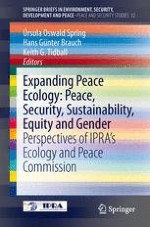2014 | OriginalPaper | Buchkapitel
4. Social and Environmental Vulnerability in a River Basin of Mexico
verfasst von : Úrsula Oswald Spring
Erschienen in: Expanding Peace Ecology: Peace, Security, Sustainability, Equity and Gender
Aktivieren Sie unsere intelligente Suche, um passende Fachinhalte oder Patente zu finden.
Wählen Sie Textabschnitte aus um mit Künstlicher Intelligenz passenden Patente zu finden. powered by
Markieren Sie Textabschnitte, um KI-gestützt weitere passende Inhalte zu finden. powered by
